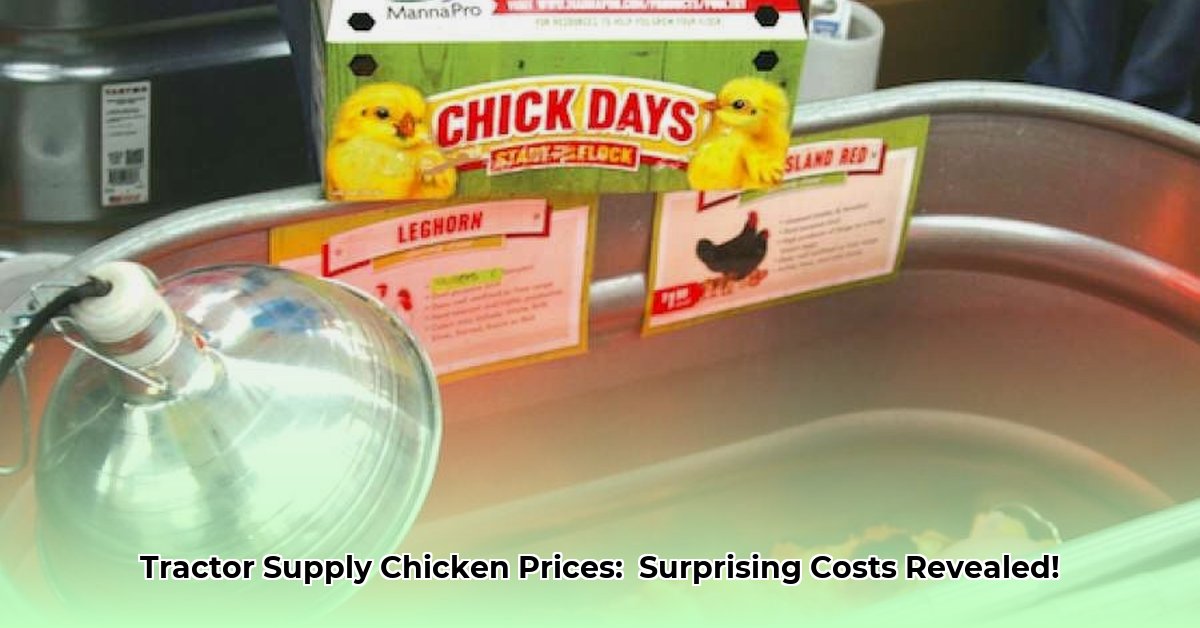
Raising backyard chickens is booming! Want to join the flock? Tractor Supply Company (TSC) is a popular one-stop shop for everything you need to get started, but understanding the costs is crucial. This guide will walk you through the expenses, from purchasing chicks to setting up their home, and beyond. We'll help you make informed decisions to ensure a financially sound and rewarding experience. Check TSC chick availability before you go.
Determining Your Needs: Choosing the Right Breed
Before you buy any chicks, decide what you want from your chickens: eggs, meat, or both? This determines the breed you choose. Different breeds have unique characteristics, affecting both initial and long-term costs.
- Egg-laying breeds like White Leghorns are prolific but produce less meat. Their lower initial cost might be offset by higher feed costs over time.
- Meat breeds like Cornish Cross chickens grow quickly, meaning faster returns, yet require more space and feed, resulting in higher initial and ongoing costs.
- Dual-purpose breeds like Rhode Island Reds offer a balance, producing both eggs and meat, but their output may not match specialized breeds in either category.
Consider your climate and available space. Smaller breeds can thrive in smaller areas, while larger breeds need more room. Some breeds are hardier and better suited to certain climates than others.
Here's a comparison of popular breeds and their approximate price range at TSC (prices vary by location, season, and availability):
| Breed | Purpose | TSC Price Range (Estimate) | Notes |
|---|---|---|---|
| Rhode Island Red | Dual-Purpose | $3-$6 | Hardy, adaptable, good for beginners |
| Cornish Cross | Meat | $4-$8 | Fast-growing, needs more space, not good layers |
| White Leghorn | Eggs | $2-$5 | Prolific layers, active foragers, can be flighty |
Cost Breakdown at Tractor Supply: Beyond the Chicks
The cost of chicks is just the beginning! You'll need a brooder (a temporary enclosure), feed, bedding, waterers, and feeders. Expect additional expenses for long-term care, including: coop and run maintenance, veterinary care, pest control, and ongoing feed costs.
Let's break down the estimated expenses:
- Chicks: $2-$10 per chick (depending on breed, age, and any sales)
- Brooder Setup: $30-$100+ (DIY or pre-made from TSC)
- Feed (initial): $15-$30 per bag (a bag lasts several weeks)
- Bedding: $10-$20 (pine shavings are recommended)
- Waterers and Feeders: $10-$30
Considering all these factors, could your budget realistically support 4-6 chicks for at least 6 months? This is a good starting point for evaluating your overall financial feasibility.
Setting Up Your Brooder: A Step-by-Step Guide
Your brooder is your chicks' temporary home—a safe, warm space for their first few weeks. Here's how to set it up:
- Location: Choose a warm, draft-free area indoors.
- Brooder Choice: Use a plastic storage bin, cardboard box, or a pre-made brooder from TSC. Size depends on the number of chicks.
- Bedding: Use several inches of pine shavings. Avoid cedar or redwood shavings.
- Heat Source: A heat lamp is common. Maintain 95-100°F (35-38°C) for the first week, gradually reducing the temperature. Use a thermometer!
- Feeders and Waterers: Use chick-sized feeders and waterers to prevent accidents.
- Cleaning: Clean regularly to maintain hygiene.
TSC offers all the necessary supplies. Remember, safety is paramount when working with young chicks.
Beyond the Chicks: Long-Term Care and Costs
Your chicks' initial weeks are just the start. Long-term chicken keeping demands consistent care and financial planning. What are your plans for housing and upkeep after the brooder stage?
- Ongoing Feed: Chicken feed is a continuous expense.
- Coop & Run: You'll need a permanent housing solution (potentially costing hundreds of dollars).
- Veterinary Care: Unexpected vet visits may be needed.
- Pest Control: Mites and other issues require preventative measures.
- Cleaning: Regular coop cleaning is essential.
Did you factor in approximately $1-$2 per chick per week for feed, plus additional maintenance costs? This illustrates the ongoing nature of chicken keeping beyond the initial investment.
Resources & Further Information
- Tractor Supply Co. Website: https://www.tractorsupply.com/
- Your Local Agricultural Extension Office: They offer invaluable advice tailored to your region.
Conclusion
Raising your own chickens is rewarding, but it’s a commitment. Carefully planning your budget and diligently tending to your flock's needs will maximize your chances of success. Use this guide as your starting point, and enjoy the journey of backyard chicken keeping!